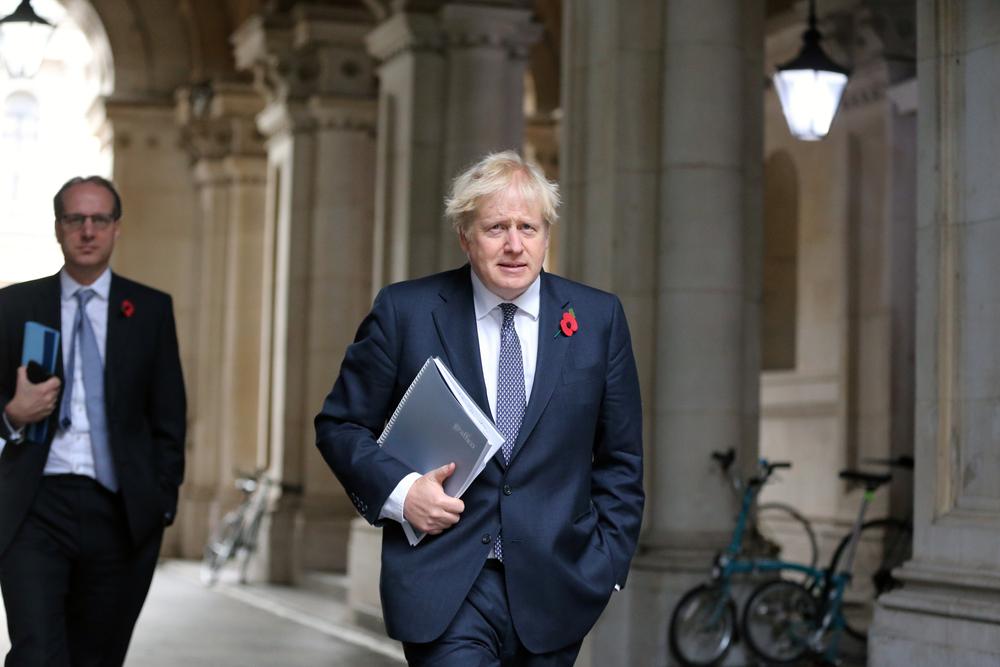Prime Minister Boris Johnson announced on Wednesday his long-awaited plan for the UK’s ‘green industrial revolution’, outlining an ambitious 10-point strategy to shift away from carbon emissions and generate up to 250,000 jobs.
Environmental groups have praised the direction of the plan but critics have questioned the scale and commitment from the private sector.
In an article published by the Financial Times on Tuesday, the PM stated that the time has come for the UK to seek green solutions as the country recovers from the coronavirus pandemic.
“Now is the time to plan for a green recovery with high-skilled jobs that give people the satisfaction of knowing they are helping to make the country cleaner, greener and more beautiful.
“This plan”, he added, “can be a global template for delivering net zero emissions in ways that create jobs and preserve our lifestyles.
“Green and growth can go hand-in-hand. So let us meet the most enduring threat to our planet with one of the most innovative and ambitious programmes of job-creation we have known”.
The full list of the PM’s climate conscious plan is as follows:
1. — To ramp up UK wind energy production with enough offshore capacity to power every home by 2030.
2. — To invest up to £500m in hydrogen power.
3. — To develop plans for few nuclear power, from large scale to small and advanced modular reactors.
4. — To invest more than £2.8bn in electric vehicles and end the sale of new petrol and diesel cars and vans in 2030 (but still permit the sale of hybrid vehicles that can “drive a significant distance with no carbon coming out of the tailpipe” until 2035).
5. — To achieve “cleaner public transport”, including green buses and new cycle lanes.
6. — To achieve nonstop transatlantic travel by manufacturing zero emissions planes and ships.
7. — To invest £1bn in 2019 alone to “make homes, schools and hospitals greener, and energy bills lower”.
8. — To establish a new “world-leading” industry in carbon capture and storage, backed by £1bn of government investment with focus on “clusters” in the North, Wales and Scotland.
9. — To “harness nature’s ability to absorb carbon” by planting 30,000 hectares of trees per year by 2025 and “rewild 30,000 football pitches’ worth of countryside”.
10. — To invest in and fund new low-carbon technologies, and strive to make the City of London the “global centre for green finance” through sovereign bonds, carbon offset markets and disclosure requirements.
While the PM has hailed the plan for “making strides” towards the UK’s net zero by 2050 pledge, some Labour MPs have called it a ‘pale imitation’ of the measures necessary to combat climate change.
Shadow business secretary Ed Miliband – whose plan for a green Covid recovery announced in the spring involves £30bn spent over 18 months – said the No 10 proposals fall below the mark and contain several “reheated pledges”.
“People are losing their jobs now. This isn’t fundamentally a green stimulus, it’s nowhere near the scale of what is required.
“This announcement doesn’t remotely meet the scale of the jobs emergency or the climate emergency. France and Germany are investing tens of billions of euros. This provides, at best, £4bn of new money over several years.
“What we needed was a really bold green economic stimulus, and what we got was a pale imitation of that. It’s deeply, deeply disappointing”.
Green Party MP Caroline Lucas similarly criticised the plan as “vague and underpowered”, stating:
“This is a shopping list, not a plan to address the climate emergency, and it commits only a fraction of the necessary resources”.
Others have been more encouraging, however, with the director of SME-focused bank Conister Finance & Leasing Ltd welcoming the PM’s pledges and the opportunities ahead for small and medium-sized businesses.
“The government’s plan shows that it is serious about a transition to a new economy, with some concrete commitments announced to accelerate the move towards a net zero carbon economy by 2050. There are significant opportunities for the SME sector to capitalise on this transition”.
Randeep Somel, fund manager for M&G’s new Climate Change Solutions Fund launched this week, added:
“The UK government is striking at the main sources of CO2 in our economies; power generation, transportation, and building efficiency.
“Not only will these investments help the UK in reaching its Paris Climate Deal commitments, they will provide stimulus to an economy that is still reeling from the Covid-19 pandemic.
“The UK has begun the process to address a myriad of challenges via its green industrial revolution announcement. While critics may say the £4 billion allocated so far by the government is too small, it is a strong statement of intent and one that is likely to spur private sector investment many multiples of the announced government figure”.
Nicola Shaw, the UK executive director of National Grid, rounded off the mixed reaction with a plea for corporations to work with the government to achieve the PM’s commitments:
“The prime minister has set out great ambition for the net zero transition including commitments on offshore wind, hydrogen and carbon capture and storage.
“Now, industry and government must work together to turn this ambition into reality, with transformational investments to deliver real change, which will create jobs in every part of the country”.

